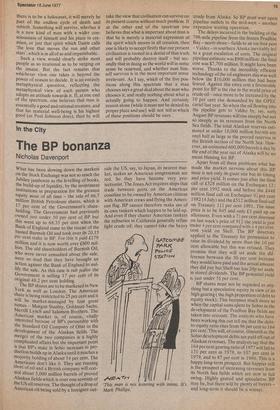in the City
The BP bonanza
Nicholas Davenport
What has been slowing down the market.; on the Stock Exchange was not so much the Jubilee jamboree as the levelling of books, the build-up of liquidity, by the investment institutions in preparation for the greatest
equity issue of all time the sale of i
66.7 million British Petroleum shares, which s 17 per cent of the Government's shareholding. The Government had previously owned just under 50 per cent of BP but this went up to 68.35 per cent when the Bank of England came to the rescue of the busted Burmah Oil and took over its 20.15 per cent stake in BP. For this it paid £179 million and it is now worth over £600 million. The old shareholders of Burmah
Who were never consulted about the sale, were so mad that they have brought an action against the Bank of England to nullify the sale. As this case is sub judice the Government is selling 17 per cent of its original 48.2 per cent holding.
The BP shares are to be marketed in New York as well as London. The American share is being restricted to 25 per cent and it will be market-managed by four great names Morgan Stanley, Goldman Sachs, Merrill Lynch and Salomon Brothers. The A. merican market is, of course, vitally interested because of BP's partnership with the Standard Oil Company of Ohio in the development of the Alaskan fields. The merger of the two companies is a highly complicated affairs but the important point is that BP's stake in Sohio increases as production builds up in Alaska until it reaches a majority holding of about 54 per cent. The Americans don't like it. They are running short of oil and a British company will control about 5,000 million barrels of proved Alaskan fields which is over one-seventh of the US oil reserves. The thought of a drop of American oil being sold by a foreigner out
side the US, say, to Japan, its nearest market, makes an American congressman see red. So they have become very protectionist. The Jones Act requires ships that trade between ports on the American coastline to be owned by American citizens with American crews and flying the American flag. BP cannot therefore make use of its own tankers which happen to be laid up. And even if they charter American tankers the refineries in California generally refine light crude oil; they cannot take the heavy crude from Alaska. So BP must wait upon pipeline outlets to the mid-west another expensive waiting operation.
The delays incurred in the building of the 798-mile pipeline from the frozen Prudhoe Bay north shore fields to an ice-free port Valdez in southern Alaska inevitably led to a great escalation of costs. The original pipeline estimate was $900 million: the final cost was $7,700 million. It might have been worse. Thanks to the incredibly efficient technology of the oil engineers this was well below the $10,000 million that had been feared. Against this extra cost a favourable point for BP is the rise in the world price of crude oil once more to be increased by the 10 per cent rise demanded by the OPEC cartel last year. So when the oil flowing into the pipeline gets to Valdez by, say, early August BP revenues will rise steeply but not so steeply as its revenues from the North Sea fields. The total Alaskan reserves estimated at under 10,000 million barrels are onyl half as large as the proved reserves in the British section of the North Sea. However, an estimated 600,000 barrels a day by the end of the year out of Alaska will be no mean blessing for BP.
Apart from all these problems what has made the market nervous about this BP issue is not only its giant size but its timing and price yield. It comes just after the final call of £328 million on the Exchequer 121 per cent 1992 stock and before the £448 million final call on Exchequer 91 per cent 1982 (4 July) and the £512 million final call on Treasury 111 per cent 1991. The issue price is to be 845 and only £3 paid up on allotment. Even with a 71 per cent discount on last week's price of 912 the yield is just under 4 per cent compared with a 4 per cent cent yield on Shell. The BP directors applied to the Treasury for permission to raise its dividend by more than the 10 per cent allowable but this was refused. They promise that they will set aside the difference between the 50 per cent increase they would have paid and the actual amount they did pay but Shell too has 20p set aside in stored dividends. The BP potential yield is just under 5i per cent.
BP shares must not be regarded as anything but a speculative equity in view of its high gearing ( the high proportion of debt to equity stock). This becomes much more so when the capital sums spent by Sohio in the development of the Prudhoe Bay fields are taken into account. The analysts who have been working this out tell me that the debtto-equity ratio rises from 96 per cent to 164 percent. This will, of course, diminish as the Sohio development debts are paid off out of Alaskan revenues. The analysts say that the 164 per cent gearing ratio of 1977 will fall to 131 per cent in 1978, to 107 per cent in 1979, and to 87 per cent in 1980. This is a happy long-term prospect. But happier still is the prospect of increasing revenues from its North Sea fields which are now in full swing. Highly geared and speculative BP may be, but there will be plenty of buyers and long-term it should be a winner. It's


































 Previous page
Previous page